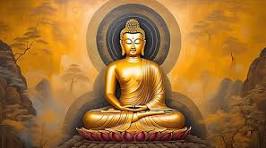International Abhidhamma Day: A Deep Dive into Buddhist Wisdom

International Abhidhamma Day is a significant event in the Buddhist calendar, celebrated primarily in Theravada Buddhist countries like Myanmar, Sri Lanka, Thailand, and Cambodia. This day holds deep spiritual and philosophical importance as it commemorates the Buddha’s descent from Tavatimsa Heaven after teaching the Abhidhamma, the most profound of Buddhist teachings, to his mother, Maya Devi. Celebrated on the full moon day of the seventh month in the Burmese calendar (generally in October), the occasion is not only a time for reflection but also an opportunity to immerse oneself in the complexities of the Buddhist doctrine.

The Story Behind Abhidhamma Day
According to Buddhist tradition, after attaining enlightenment, the Buddha ascended to Tavatimsa Heaven to deliver the teachings of the Abhidhamma to his mother, who had been reborn in that celestial realm. The Buddha is said to have spent three months in heaven, expounding the intricate details of the Abhidhamma, which is considered the highest and most abstract form of his teachings. It explains the nature of mind, matter, and the realities governing existence.
At the end of the three months, Buddha descended back to earth, and this descent is what is celebrated as International Abhidhamma Day. The event signifies not just his return but also the transmission of profound wisdom to humanity, helping to deepen the understanding of Buddhist philosophy. In this context, Abhidhamma Day is viewed as a time to honor the Buddha’s compassion and wisdom in offering these higher teachings to all beings.
The Significance of the Abhidhamma
The Abhidhamma Pitaka, one of the three main divisions of the Tripitaka (the Buddhist canon), delves into the nature of consciousness, mental phenomena, and the intricacies of karmic law. While the Sutta Pitaka and the Vinaya Pitaka deal with the Buddha’s discourses and monastic rules, the Abhidhamma Pitaka goes beyond the conventional teachings, offering an analytical framework for understanding the workings of the mind and reality.
It is considered the most challenging part of Buddhist teachings due to its complexity and depth. The Abhidhamma does not rely on narratives or stories but instead uses a scientific and philosophical approach to dissect mental processes and categorize human experiences. It is highly regarded among Buddhist scholars and meditators, who use it as a foundation for deepening their practice and understanding of the mind.
How International Abhidhamma Day is Celebrated
International Abhidhamma Day is observed with a mix of religious ceremonies, meditation sessions, and acts of merit-making. In countries like Myanmar, large-scale celebrations are organized, including processions, offering alms to monks, and group prayers. Temples and monasteries hold special services, during which sections of the Abhidhamma are recited, and devotees reflect on the teachings of the Buddha.
Many Buddhists also use this occasion to participate in Dhamma discussions, meditate, and engage in charitable acts, believing that generating merit on this day will lead to greater spiritual progress. Monks and laypeople alike are encouraged to study the Abhidhamma in greater depth, exploring its teachings on the nature of consciousness and reality.
Relevance in the Modern World
Though deeply rooted in tradition, International Abhidhamma Day offers valuable lessons for modern life. The Abhidhamma’s focus on understanding the mind resonates with contemporary psychological practices, especially mindfulness and meditation, which have gained global popularity. In an age where mental health and mindfulness are becoming increasingly important, the Abhidhamma’s teachings on the mind’s workings offer a time-tested, profound resource for achieving inner peace and clarity.
In conclusion, International Abhidhamma Day is more than just a religious observance; it is a celebration of wisdom, mindfulness, and the deep spiritual insights offered by the Buddha. It serves as a reminder of the importance of self-awareness and mental discipline, key aspects of both Buddhist practice and modern life.







